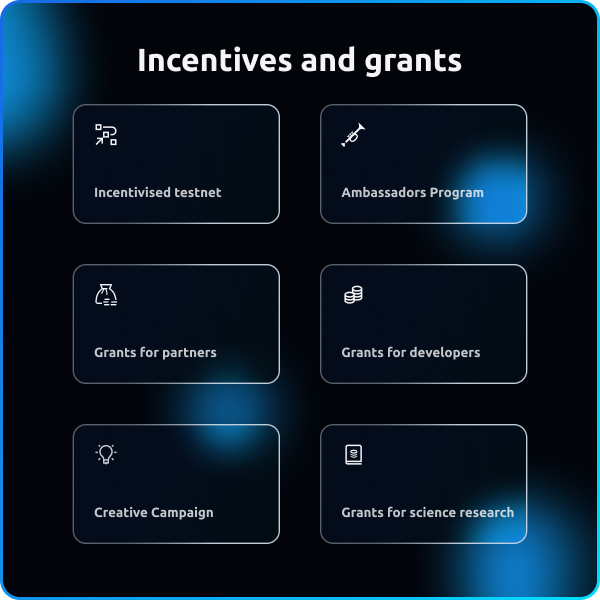The basic principles of web3 are disintermediation – eliminating intermediaries by creating real peer-to-peer social and transactional relationships and meritocracy – rewarding people based on their real contributions, both financially and through social recognition.
Web3 has the potential to fundamentally reshape the underlying social and economic structure and satisfy people's desire to be part of a community of creators, brands, or interests in brand new ways.
In Power Ecosystem we believe in the power of community. We are building an analog of the AWS cloud platform but fully decentralized and for web3 applications. Unlike AWS which is owned by individuals we want our products to be owned by the web3 community.
We believe in the core principles of web3 that's why in our roadmap it is mandatory to form a DAO, which will be given into the ownership and management of our main product - DCloud. The DAO will manage the DCloud and from a certain point will be responsible for its further development.
The difference between the role of community in web2 and web3 is that through the new mechanics, the community is transformed from "passive observers' to active contributors. They contribute to the creation and even management of companies, brands, networks, etc. The community becomes more interested in success than ever before.
By aligning member and stakeholder incentives, decentralized web3 communities can maximize both social capital and useful value.
Web3 offers new and much more streamlined ways to create, recognize and reward the contributions of community members.
Web3 creators seek to engage audiences in more meaningful and value-enhancing ways by engaging them in the process of co-creation and sharing the benefits with them.
Community and tokens
Tokens are one of the most important parts of go-to-market strategy, because tokens take the role of the community to the next level. Community tokens or social tokens derive their value from the growth of shared creators and their communities. While most current projects are at a proof-of-concept stage, the long-term goal is to create an entirely new way to power the content creator economy. Tokenization can create unique ecosystems that are far more user-friendly and rewarding than current advertising and subscription models.
Tokens can be obtained by participating in the community, participating in various activities and contests, testing the product, and so on. Rewards in the form of tokens are the best tool to build a community. By getting a token, the community member has a direct interest in the success of the project.
What new ways of interacting with the community exist in web3?
As we already said, in web3 we're not focusing only on building a community of fans, but on building a community of contributors, co-owners and active participants, so let's talk about what tools are available to do that.
Incentive activities
Incentive campaigns are aimed at actively involving users in the life of the project using community tokens as a reward.
In general, there are two types of incentive activities – technological and creative.
Testnet
Testnet is a test network designed for testing and experimentation without risk to the core network. Testnet users can test services, analyze data, complete tasks, suggest ideas for product development, and receive rewards for their work.
Most projects are used to think of a testnet as just a test network. But for a web3 project, it has become a great way to start interacting with the technological community. On the one hand, testnet is about technology, but on the other hand, it is about community building. Some projects within the testnet solve only the second part - just involve as many participants as possible (node runners); other projects go further and actually solve some interesting technological issues.
In our testnet we plan to allocate a separate group of participants - who will participate in our experiments, doing things that no one has done before us. We find it insanely interesting, and we hope to find and attract people with a similar mindset.
Creative campaign
When we talk about creative incentive campaigns it can be contests, games, special offers, and other activities to involve the community in creating, developing, or managing the platform.
There are no limits in these campaigns, only the imagination of the organizer. The main key to success is not to forget about the basic principles of web3.
For example, ECO has a bunch of successful incentive activities: ECO Art Therapy, Research Meme Contest, and much more.
DAO
DAO stands for Decentralized Autonomous Organization. A DAO is a specific form of organization in which coordination of activities between participants is performed without centralized management, but using automatic algorithms. In the crypto industry, the work of DAOs is usually based on smart contracts, so the real infrastructure for DAOs appeared thanks to Ethereum. Today, with Ethereum having many alternatives, DAO can be built on any blockchain that supports smart contracts.
It is important to understand that a DAO is a management unit, not the entire project.
There is a misunderstanding of DAO, when a decentralized autonomous organization refers to the entire project, which is managed by the DAO, because of which it includes, for example, the cryptocurrency Dash, the blockchain media platform Steemit, Decentraland metaverse, decentralized cryptocurrency exchanges (DEX). However, DAO is more correctly understood as a decentralized management infrastructure.
Conclusion
As you know, the cryptocurrency market is going through a difficult time right now. Among other things, crypto-winter happened because the basic principle of Web3 - meritocracy - was violated. Despite a lot of DAO, DeFi, and Web3 projects, the power is still concentrated in the hands of a minority who single-handedly largely determine what the future of web3 will be. Unfortunately, their decision is based more on personal benefit than on the communities.
It is vital to change this paradigm. Let's change outdated principles from the old world - Salutem aptissimum and Homo homini lupus est.






























